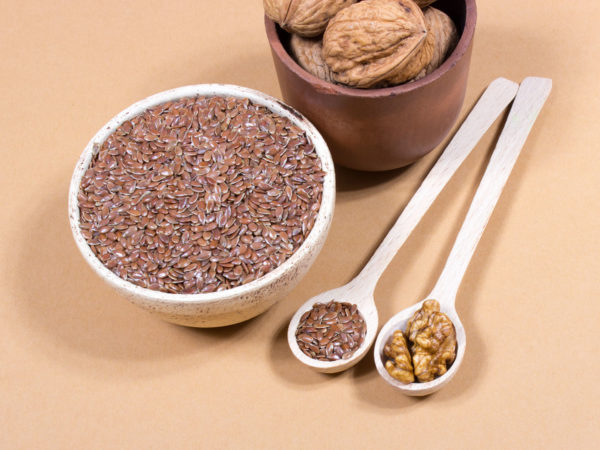Affecting the Balance Between Omega-3 and Omega-6?
How does black currant oil/borage oil affect the balance between omega-6 and omega-3 oils? Should the omega-6 from these sources be taken into account along with all the vegetable oils and other sources of omega-6 oils that are so prevalent in the typical American diet?
Andrew Weil, M.D. | May 16, 2008

Omega-3 and omega-6 are essential fatty acids – meaning we cannot make them on our own and must obtain them from our diet. Both are polyunsaturated fatty acids, although they differ from each other in chemical structure. Modern diets contain few omega-3 sources, mainly the fat of cold water fish such as salmon, sardines, herring, mackerel, black cod, and bluefish. Walnuts and flaxseeds contain a precursor omega-3, alpha-linolenic acid (ALA). There are two critical omega-3s: eicosapentaenoic acid (EPA) and docosahexaenoic (DHA), which are the building blocks for hormones that control immune function, blood clotting, and cell growth as well as components of cell membranes.
Omega-3s are plentiful in diets of unprocessed foods and where grazing animals eat grass. By contrast, today’s western diets overload us with omega-6s, mainly in oils extracted from seeds and nuts, and from the meat of animals that are fed grain. Refined vegetable oils, such as soy oil, are used in fast foods, most snack-foods, cookies, crackers, and sweets.
The body also constructs hormones from omega 6 fatty acids. These tend to increase inflammation (an important component of the immune response), blood clotting, and cell proliferation, while hormones from omega-3 fatty acids have the opposite effect. Both types of hormones must be in balance to maintain optimum health. Many nutrition experts believe that before we relied so heavily on processed foods, humans consumed omega-3 and omega-6 fatty acids in roughly equal amounts, but today most North Americans and Europeans get far too many omega-6s and not enough omega-3s. This imbalance may explain the rise of asthma, coronary heart disease, many forms of cancer, autoimmunity and neurodegenerative diseases, all of which are believed to stem from inflammation in the body.
Borage oil, black currant oil (and evening primrose oil) are natural sources of a fatty acid called GLA (gammalinolenic acid), an omega-6 fat that is very hard to come by in the diet. However, the omega-6 provided by these supplements is insignificant compared to the amounts we obtain from dietary sources, and shouldn’t affect your omega-6/omega-3 balance. GLA is an effective anti-inflammatory agent that I recommend for arthritis, autoimmune disorders, premenstrual syndrome and for healthy growth of skin, hair, and nails. (By the way, I usually do not recommend borage oil, because it might contain pyrroldizidine alkaloids, compounds that can damage the liver.) The dose of evening primrose oil or black currant oil is 500 mg twice a day.
Andrew Weil, M.D.









